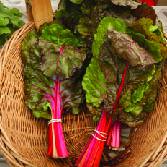-
CATEGORY ::
- All Seeds /
- All Flower Seeds /
- All Hibiscus Seeds







Hibiscus Seeds - Luna Rose
SEASON
Perennial
USDA ZONES
5 - 9
HEIGHT
24 - 36 inches
BLOOM SEASON
Early summer to late summer
BLOOM COLOR
Rose
ENVIRONMENT
Full sun
SOIL TYPE
Moist, well-drained, pH 5.8 - 6.8
DEER RESISTANT
No
SEASON
Perennial
USDA ZONES
5 - 9
HEIGHT
24 - 36 inches
BLOOM SEASON
Early summer to late summer
BLOOM COLOR
Red
ENVIRONMENT
Full sun
SOIL TYPE
Moist, well-drained, pH 5.8 - 6.8
DEER RESISTANT
No
SEASON
Perennial
USDA ZONES
9 - 10
HEIGHT
36 - 60 inches
BLOOM SEASON
Summer through fall
BLOOM COLOR
Maroon
ENVIRONMENT
Full sun
SOIL TYPE
Moist, well-drained, pH 5.8 - 6.8
DEER RESISTANT
No
SEASON
Perennial
USDA ZONES
9 - 10
HEIGHT
14 - 20 inches
BLOOM SEASON
Summer to early fall
BLOOM COLOR
White
ENVIRONMENT
Full sun
SOIL TYPE
Moist, well-drained, pH 5.8 - 6.8
DEER RESISTANT
No
SEASON
Perennial
USDA ZONES
5 - 9
HEIGHT
24 - 36 inches
BLOOM SEASON
Early summer to late summer
BLOOM COLOR
Pink
ENVIRONMENT
Full sun
SOIL TYPE
Moist, well-drained, pH 5.8 - 6.8
DEER RESISTANT
No
SEASON
Perennial
USDA ZONES
5 - 9
HEIGHT
24 - 36 inches
BLOOM SEASON
Early summer to late summer
BLOOM COLOR
Mix
ENVIRONMENT
Full sun
SOIL TYPE
Moist, well-drained, pH 5.8 - 6.8
DEER RESISTANT
No
SEASON
Perennial
USDA ZONES
5 - 9
HEIGHT
24 - 36 inches
BLOOM SEASON
Early summer to late summer
BLOOM COLOR
White
ENVIRONMENT
Full sun
SOIL TYPE
Moist, well-drained, pH 5.8 - 6.8
DEER RESISTANT
No
About...
(Hibiscus Moscheutos Luna Rose) - With deep, rich rose 6 - 8 inch blooms and dark green foliage, this perennial is an absolute eye-catcher! Grown from Hibiscus seed, it is a compact, well-branched plant that is ideal for container plantings and landscape use.MORE HIBISCUS OPTIONS
Planting Directions
TEMPERATURE
70F
AVERAGE GERM TIME
14 - 21 days
LIGHT REQUIRED
Yes
DEPTH
Cover lightly, seed should be visible
SOWING RATE
1 - 2 seeds per plant
MOISTURE
Keep seed moist until germination
PLANT SPACING
24 - 36 inches
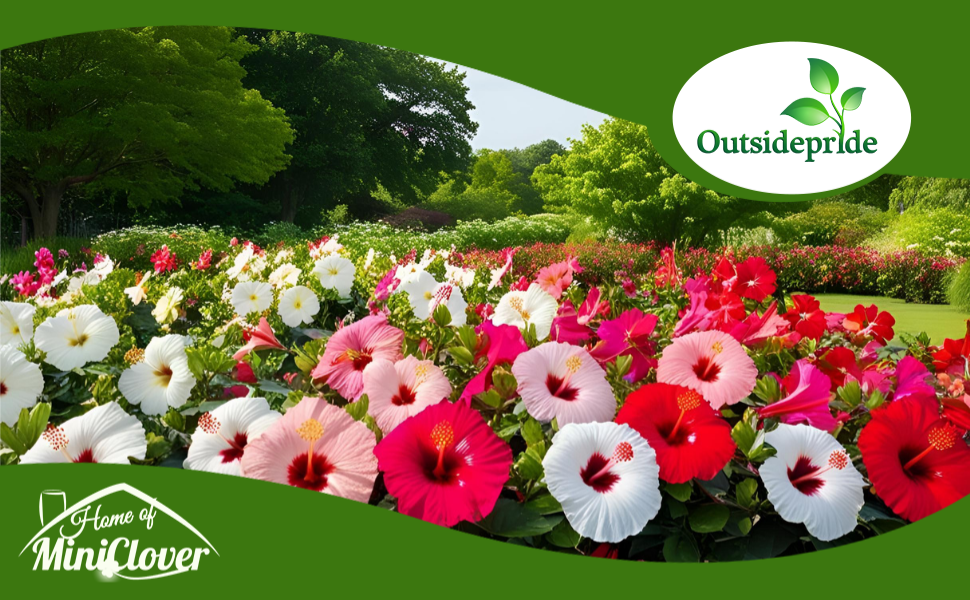
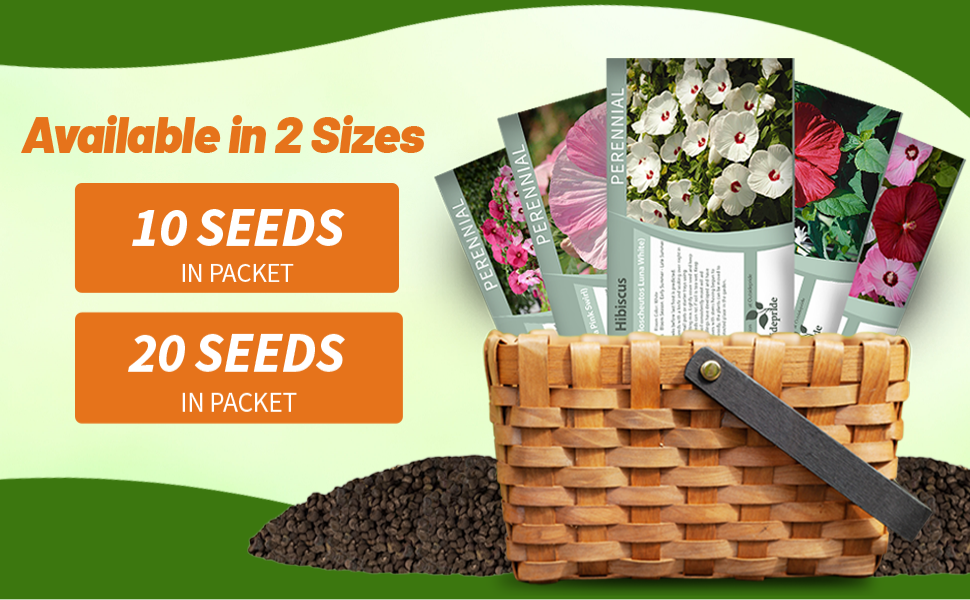
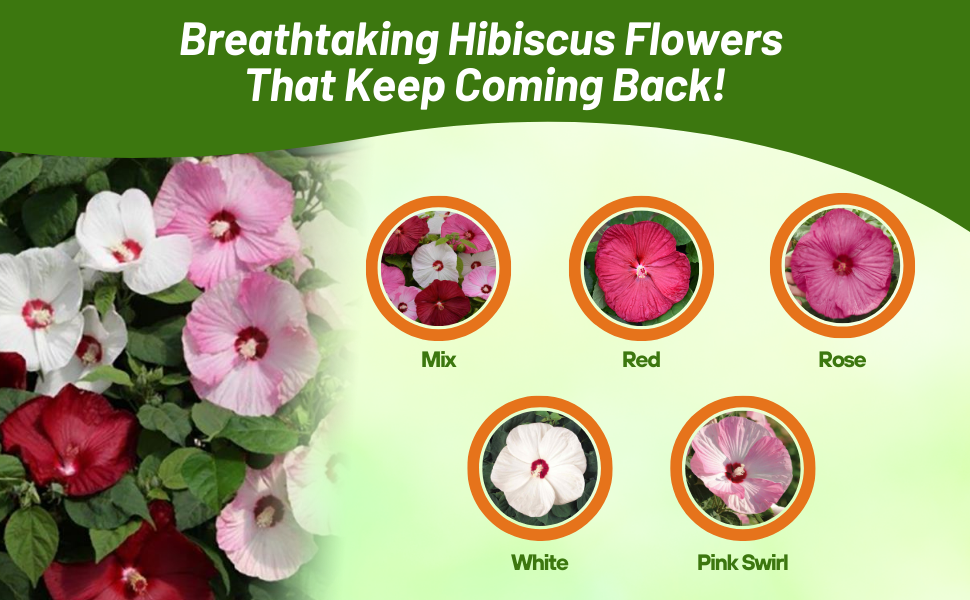
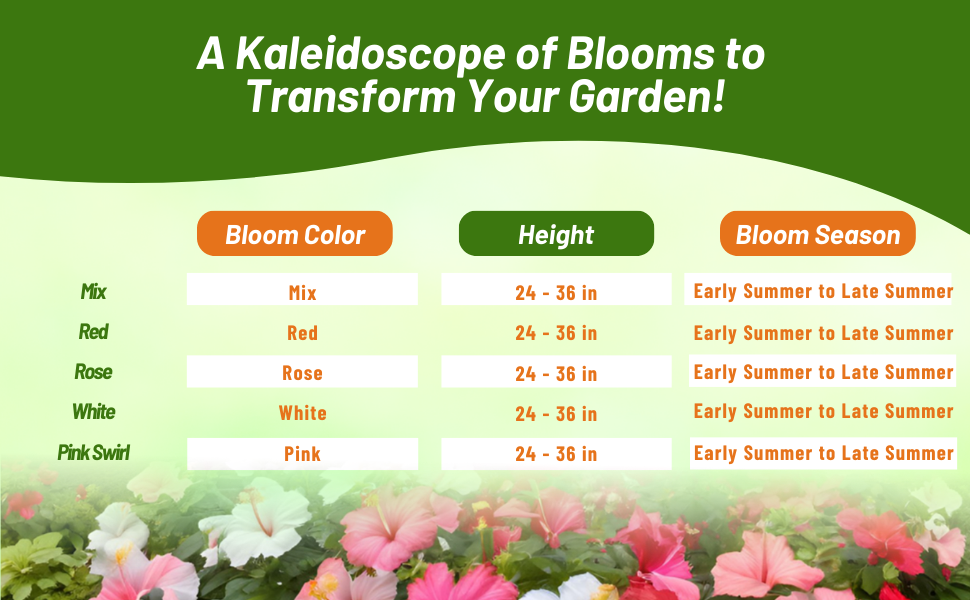
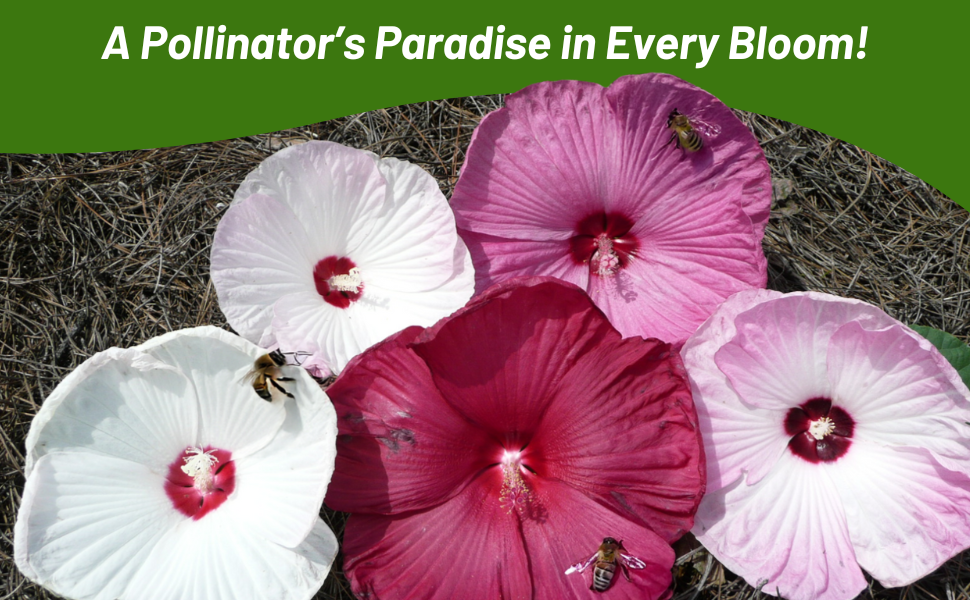
Hibiscus (Hibiscus Moscheutos Luna Rose) - With deep, rich rose 6 - 8 inch blooms and dark green foliage, this perennial is an absolute eye-catcher! Grown from Hibiscus seed, it is a compact, well-branched plant that is ideal for container plantings and landscape use. It reaches 24 - 36 inches tall and 24 inches wide and has a long bloom season. Once established, hardy Hibiscus withstands a variety of environmental conditions although it prefers a weekly deep watering. Hibiscus care includes deadheading the blooms to keep the plant producing more flowers all summer and into the fall. The picture above with the Hibiscus in the container features rose and pink swirl Hibiscus plants.
Growing Luna rose Hibiscus seeds is not complicated. Start the flower seeds indoors 6 - 8 weeks before the last frost is predicted. Most gardeners recommend nicking the seeds with a knife and soaking them over night in warm water. Sow the flower seeds into small pots or starter trays using well-draining, sterile potting mix. Lightly cover the seed and keep moist, but not soggy. The seeds can actually rot if the soil is too wet. Keeping the temperature consistently warm and the soil consistently moist will aid germination. After seedlings have developed and there are several sets of true leaves with the stems having begun to harden and become woody, the young Hibiscus plant can be moved to larger pots or to a protected place in the garden. These tender young plants should be introduced to the sun gradually over several days. At this point a water soluble fertilizer can be used.
Common Questions
Is hibiscus easy to grow?
Hardy hibiscus are more forgiving and easy to grow than tropical varieties because they tolerate a wider range of temperatures and wetter conditions.
How fast does hibiscus grow?
Hibiscuses are fast-growing, and, providing conditions are right, they can be fully established and flowering prolifically within two to three years.
How long does a hibiscus live?
While newer hybrids may not survive for more than ten years, it is quite common for older varieties to thrive for over five decades.
What are some good areas to use hibiscus in my landscape?
These are wonderful additions to perennial borders and beds for the dramatic blooms and containers. They are also great for areas along streams or ponds and rain gardens.
Do I need to deadhead my flowers?
To maintain a tidy appearance, you will need to deadhead the spent blooms.
When do I prune back my plants?
This is best done in the spring before any new growth appears.
Planting Directions
TEMPERATURE
70F
AVERAGE GERM TIME
14 - 21 days
LIGHT REQUIRED
Yes
DEPTH
Cover lightly, seed should be visible
SOWING RATE
1 - 2 seeds per plant
MOISTURE
Keep seed moist until germination
PLANT SPACING
24 - 36 inches
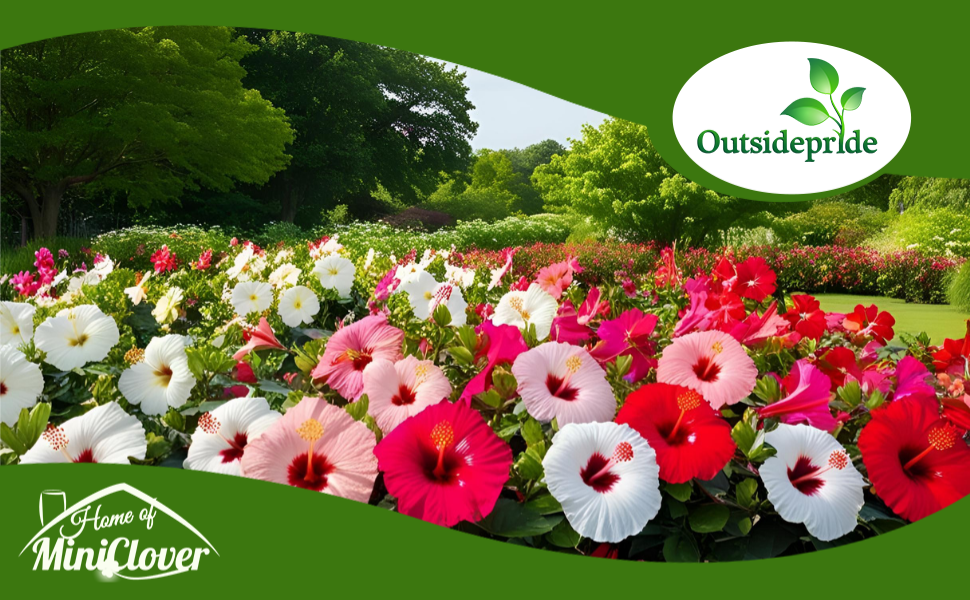
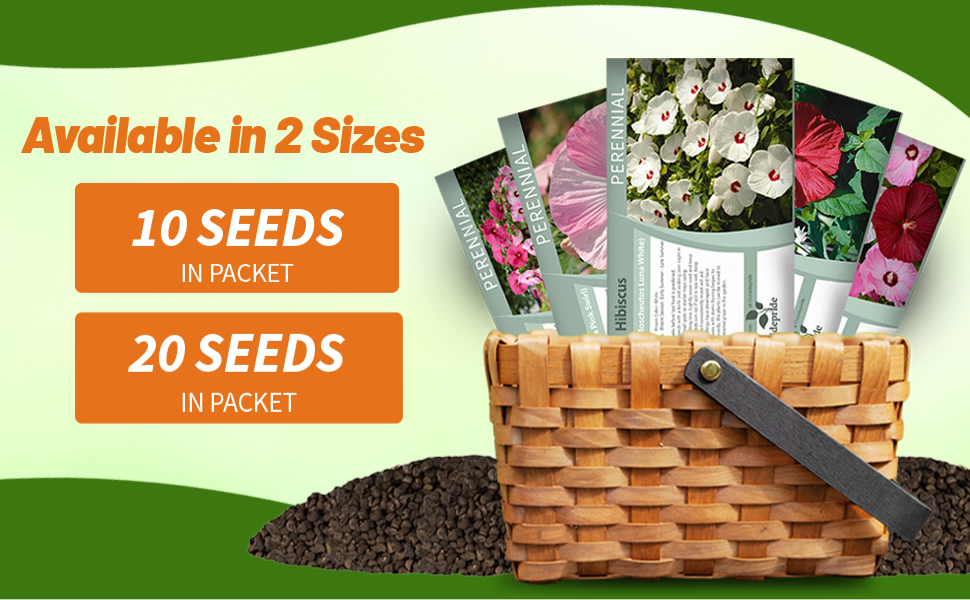
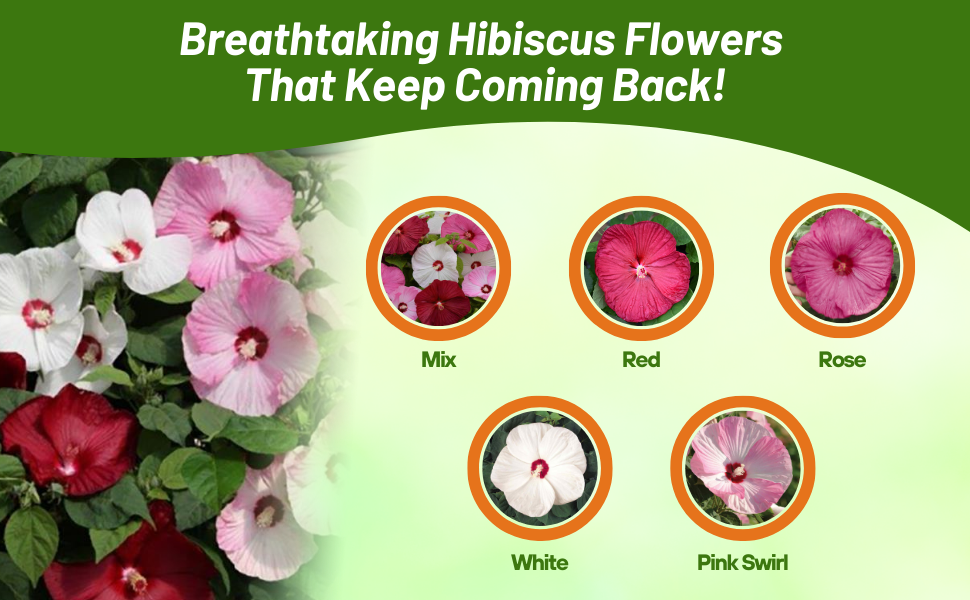
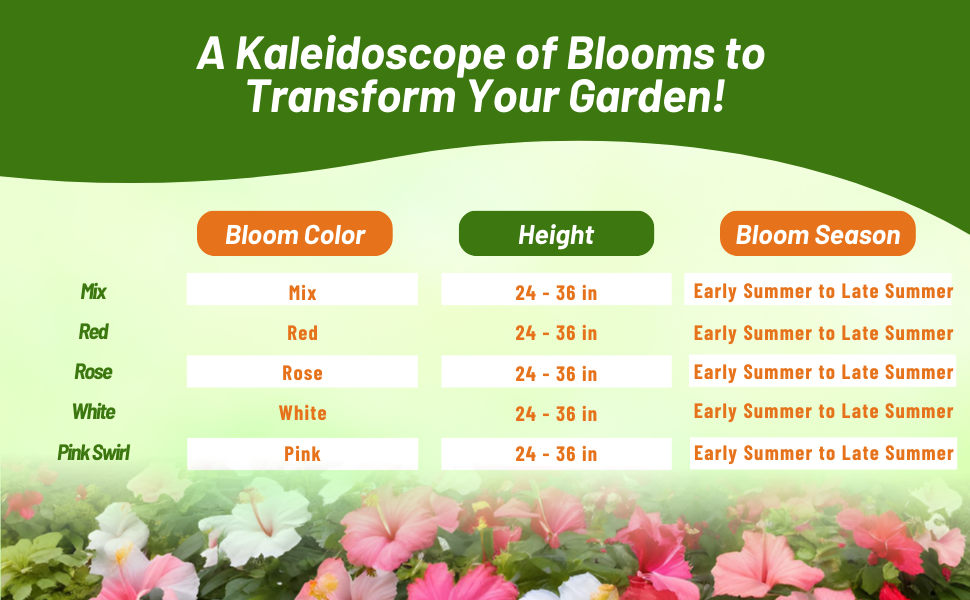
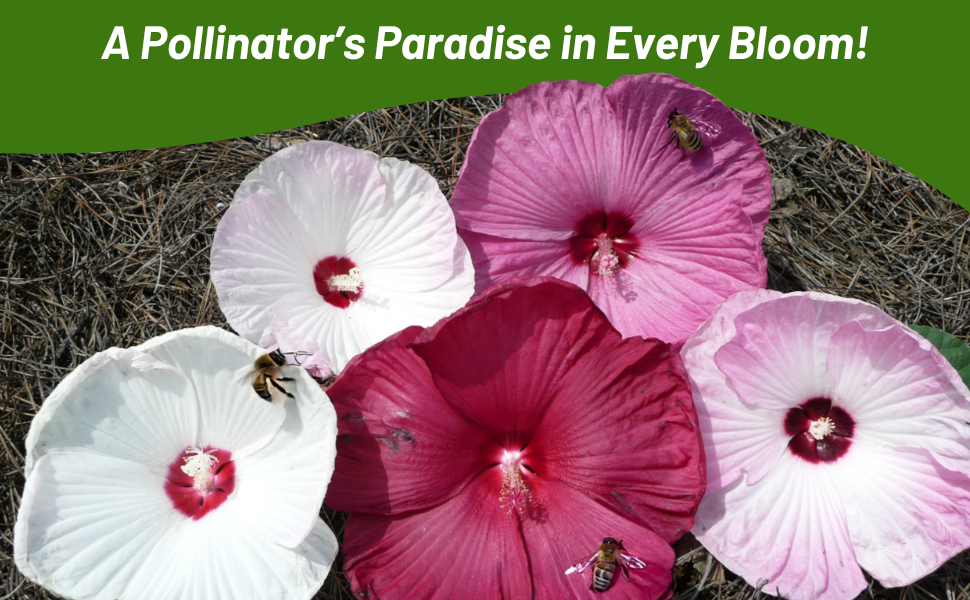
Hibiscus (Hibiscus Moscheutos Luna Red) - With deep, rich red 6 - 8 inch blooms and dark green foliage, this perennial is an absolute eye-catcher! Grown from Hibiscus seed, it is a compact, well-branched plant that is ideal for container plantings and landscape use. It reaches 24 - 36 inches tall and 24 inches wide and has a long bloom season.
Common Questions
Are hibiscus easy to grow?
Hardy hibiscus are more forgiving and easy to grow than tropical varieties because they tolerate a wider range of temperatures and wetter conditions.
How fast do hibiscus grow?
Hibiscus are fast-growing, and, providing conditions are right, they can be fully established and flowering prolifically within two to three years.
How long does a hibiscus live?
While newer hybrids may not survive for more than ten years, it is quite common for older varieties to thrive for over five decades.
What are some good areas to use hibiscus in my landscape?
These are wonderful additions to perennial borders and beds for the dramatic blooms and containers. They are also great for areas along streams or ponds and rain gardens.
Do I need to deadhead my flowers?
To maintain a tidy appearance, you will need to deadhead the spent blooms.
When do I prune back my plants?
This is best done in the spring before any new growth appears.
Planting Directions
TEMPERATURE
70F
AVERAGE GERM TIME
14 - 21 days
LIGHT REQUIRED
Yes
DEPTH
Cover lightly, seed should be visible
SOWING RATE
2 - 3 seeds per plant
MOISTURE
Keep seed moist until germination
PLANT SPACING
24 - 36 inches

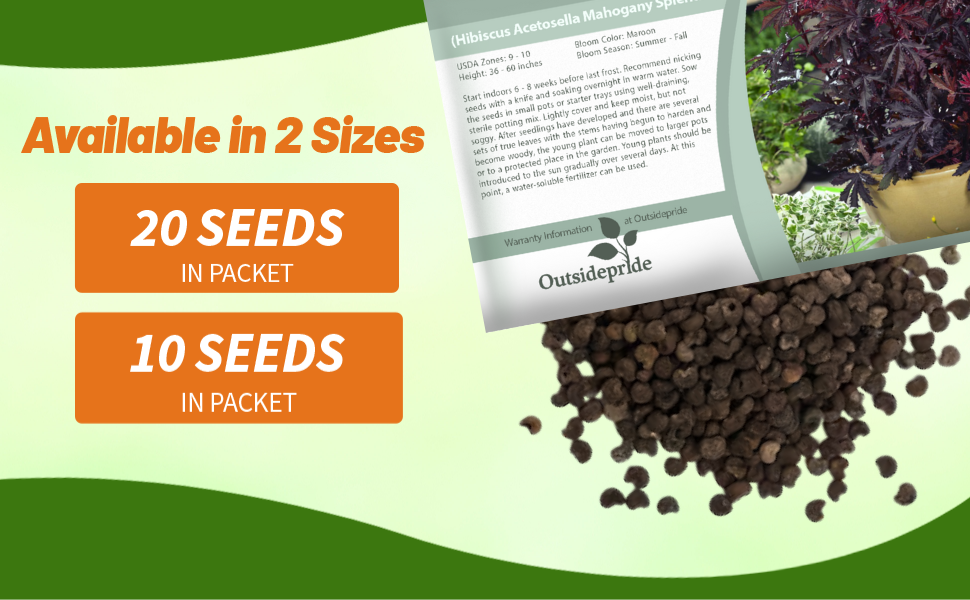
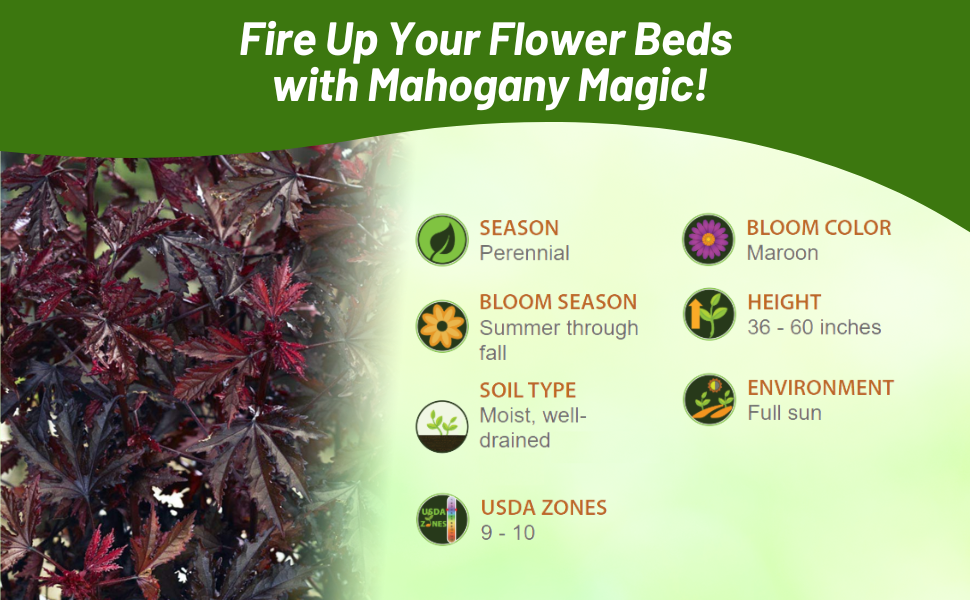
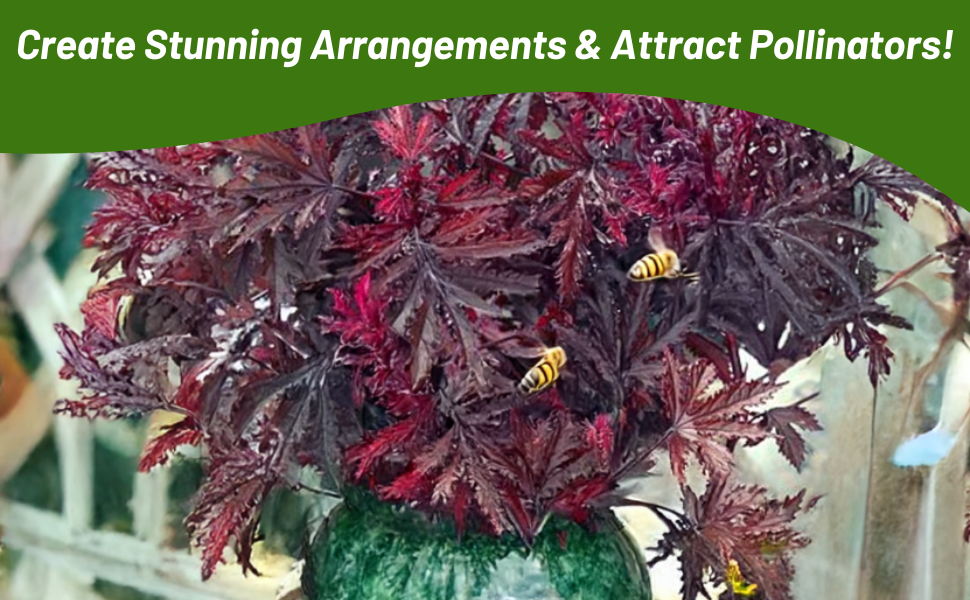
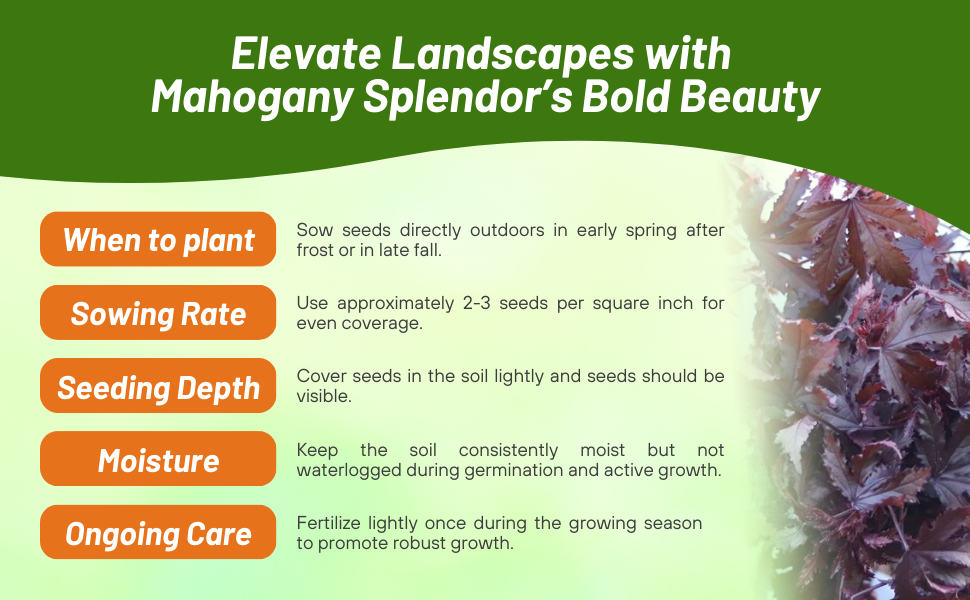
Hibiscus (Hibiscus Acetosella Mahogany Splendor) - If you have never grown Hibiscus from flower seeds, then let this be your first time! This tropical plant shoots up in no time, adds color to the garden for months, and needs almost no care to keep it happy. Grow this Hibiscus seed and you have got one of the showiest red-leaf plants available.
Common Questions
Do I need to prune my hibiscus acetosella?
Maintain the health and shape of your plants by removing any dead, damaged, or overcrowded stems. Pruning is best done in late winter or early spring before new growth starts. To promote bushier growth, pinch back the tips of young plants. When growing plants in containers, regular pruning is essential to manage size and promote a fuller appearance.
Do I need to fertilize hibiscus acetosella?
Apply a well-balanced all-purpose fertilizer or one rich in potassium and phosphorus to promote lush foliage and robust growth. Use the fertilizer in spring as new growth emerges and reapply in mid-summer if necessary. Always adhere to the instructions on the package regarding the application rate and frequency.
What is the best way to water my plants?
Maintain soil moisture consistently, avoiding waterlogging. Regularly water the plants, especially in hot, dry spells. Decrease watering during cooler months when growth is slower. Water at the plant's base to prevent wetting the foliage, reducing the risk of fungal diseases.
What are some good companion plants?
Plants such as agapanthus, cannas and zinnias all look lovely with heuchera.
Planting Directions
TEMPERATURE
70F
AVERAGE GERM TIME
14 - 21 days
LIGHT REQUIRED
Yes
DEPTH
Cover lightly, seed should be visible
SOWING RATE
2 - 3 seeds per plant
MOISTURE
Keep seed moist until germination
PLANT SPACING
12 - 18 inches
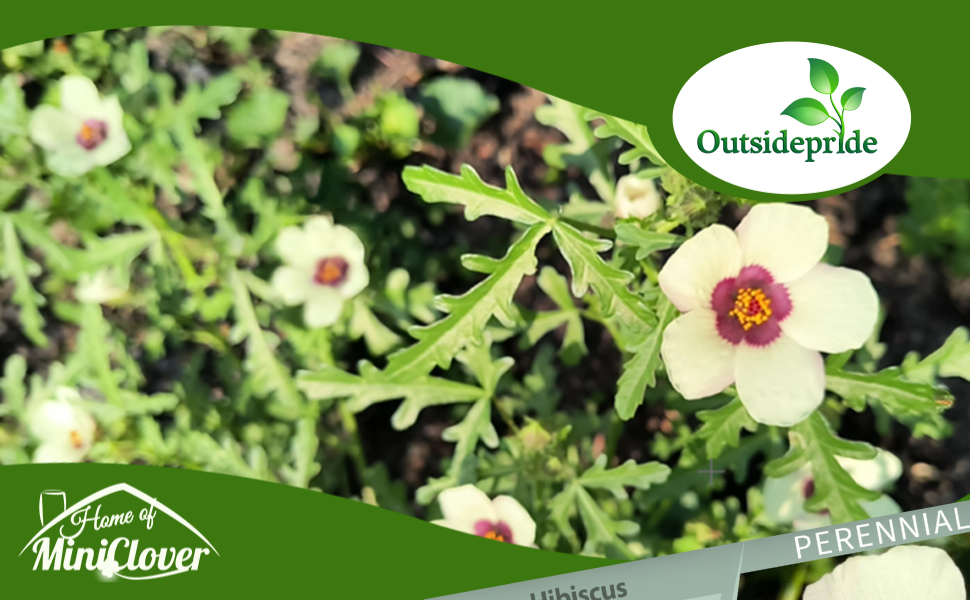
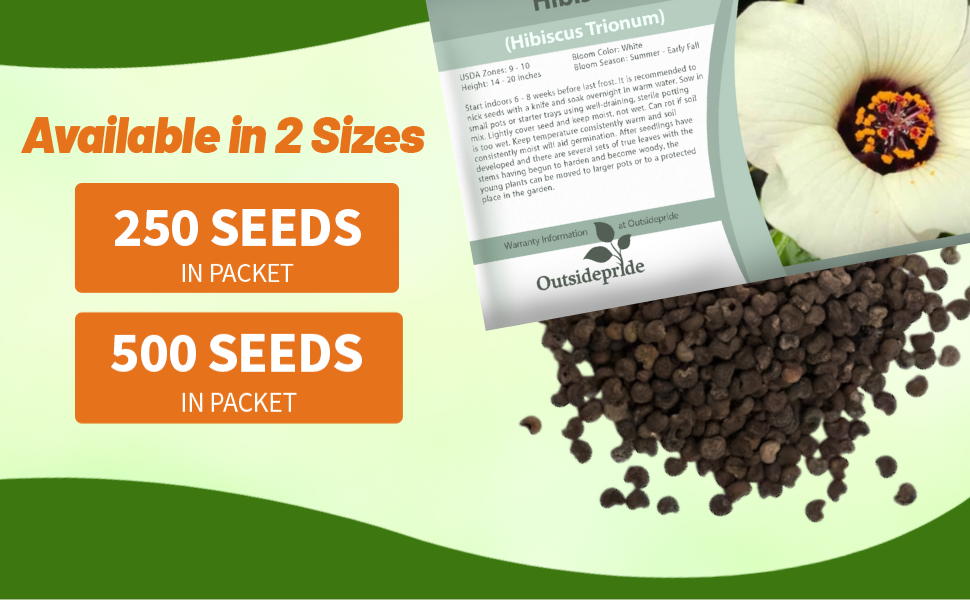
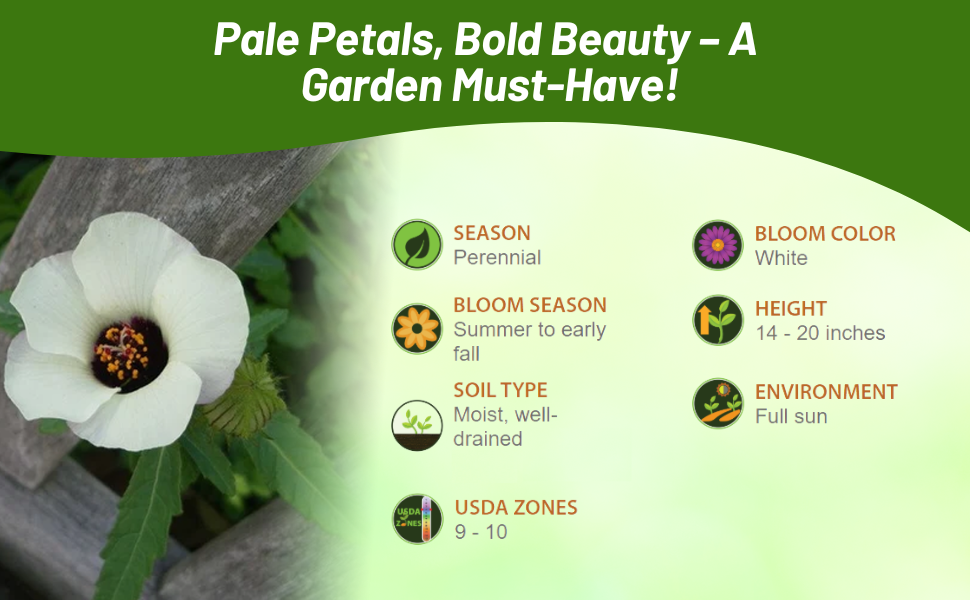
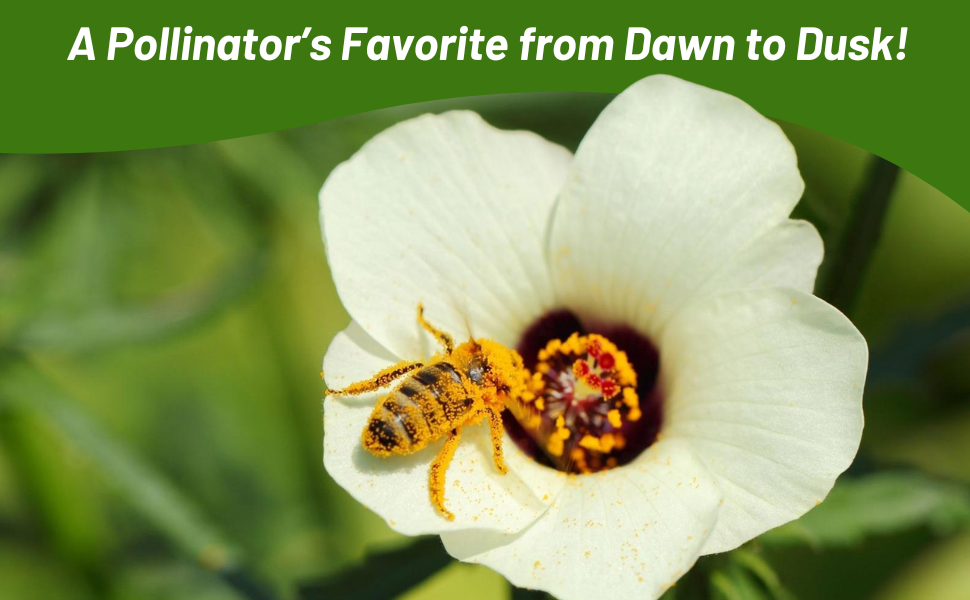
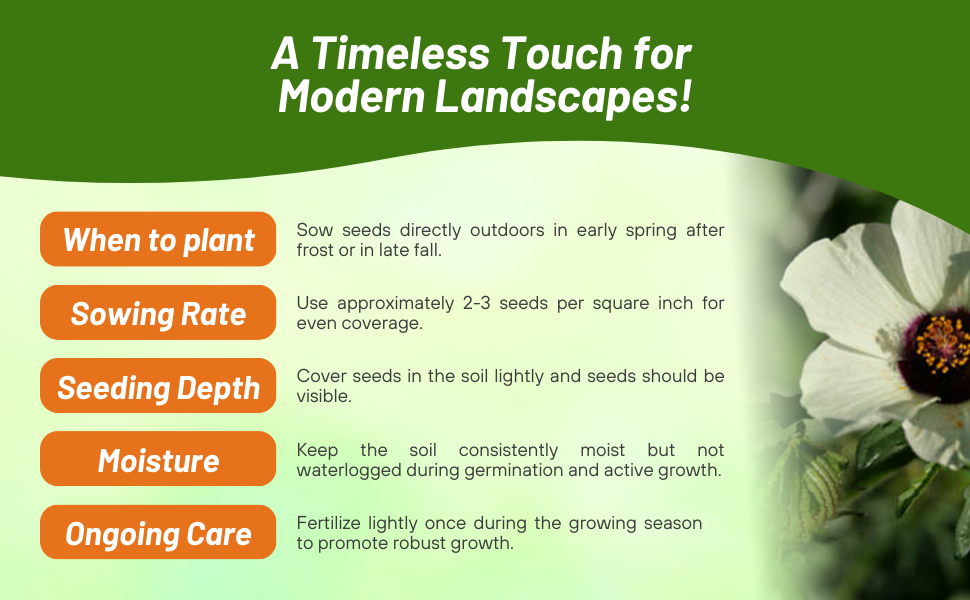
Hibiscus (Hibiscus Trionum) - If you enjoy large, dramatic flowers in the landscape, you will want to start Hibiscus seeds! This Hibiscus plant grows as an annual, but in frost free zones or if wintered indoors, will grow as a perennial. It provides exotic, large 3 - 4 inch silvery blooms with chocolate-purple centers. These large, showing blooms are short-lived but constantly are being replaced with fresh, new blooms. Heat tolerant and a lover of full sun, this well-branched, bushy plant is a stand out in the summer garden!
Growing Hibiscus seeds is not complicated. Start the flower seeds indoors 6 - 8 weeks before the last frost is predicted. Most gardeners recommend nicking the seeds with a knife and soaking them over night in warm water. Sow the flower seeds into small pots or starter trays using well-draining, sterile potting mix. Lightly cover the seed and keep moist, but not soggy. Keeping the temperature consistently warm and the soil consistently moist will aid germination. After seedlings have developed and there are several sets of true leaves with the stems having begun to harden and become woody, the young Hibiscus plant can be moved to larger pots or to a protected place in the garden. These tender young plants should be introduced to the sun gradually over several days.
Common Questions
Do I need to prune my hibiscus?
Maintain the health and shape of your plants by removing any dead, damaged, or overcrowded stems. Pruning is best done in late winter or early spring before new growth starts. To promote bushier growth, pinch back the tips of young plants. When growing plants in containers, regular pruning is essential to manage size and promote a fuller appearance.
Do I need to fertilize hibiscus?
Apply a well-balanced all-purpose fertilizer or one rich in potassium and phosphorus to promote lush foliage and robust growth. Use the fertilizer in spring as new growth emerges and reapply in mid-summer if necessary. Always adhere to the instructions on the package regarding the application rate and frequency.
What is the best way to water my plants?
Maintain soil moisture consistently, avoiding waterlogging. Regularly water the plants, especially in hot, dry spells. Decrease watering during cooler months when growth is slower. Water at the plant's base to prevent wetting the foliage, reducing the risk of fungal diseases.
Planting Directions
TEMPERATURE
70F
AVERAGE GERM TIME
14 - 21 days
LIGHT REQUIRED
Yes
DEPTH
Cover lightly, seed should be visible
SOWING RATE
1 - 2 seeds per plant
MOISTURE
Keep seed moist until germination
PLANT SPACING
24 - 36 inches
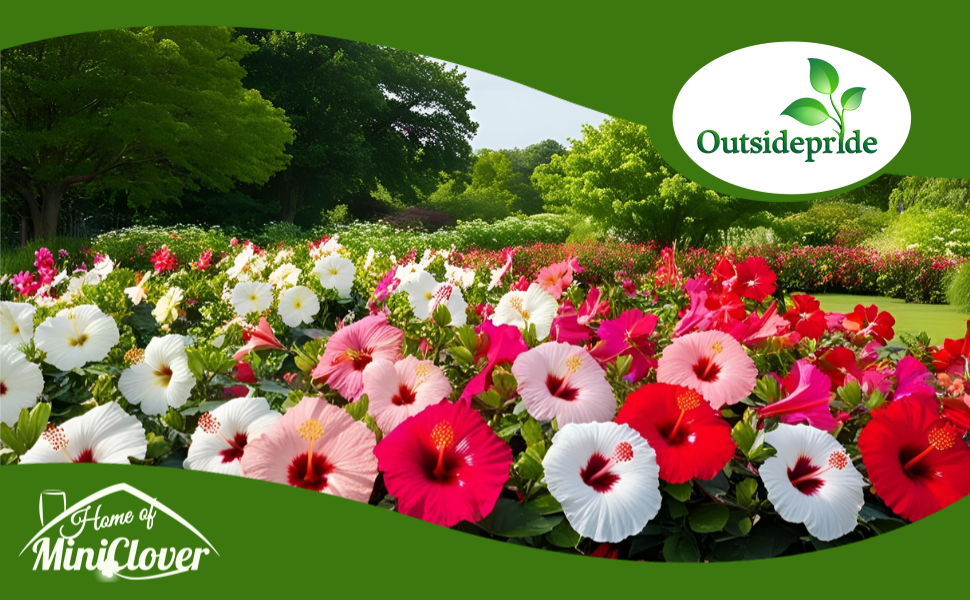
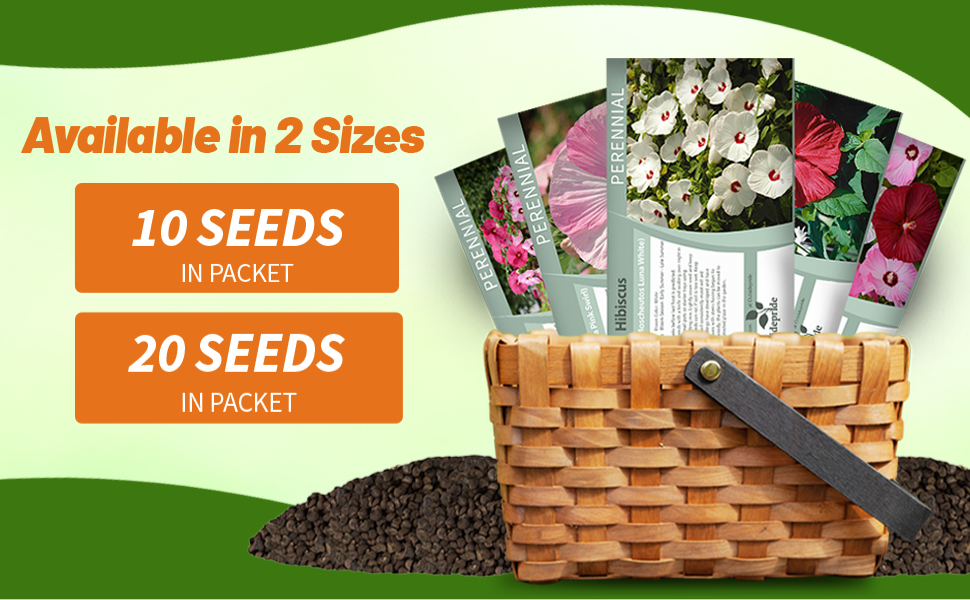
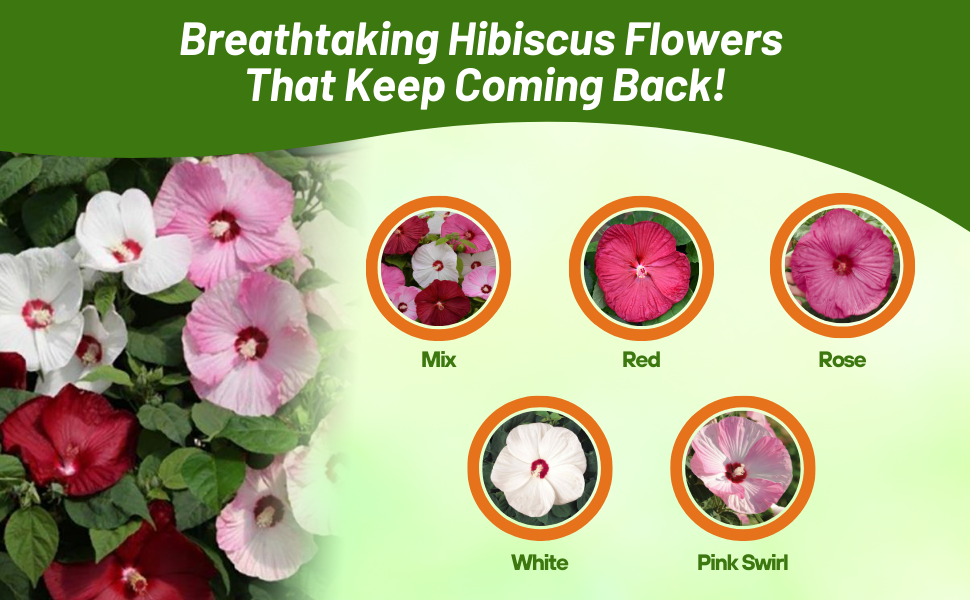
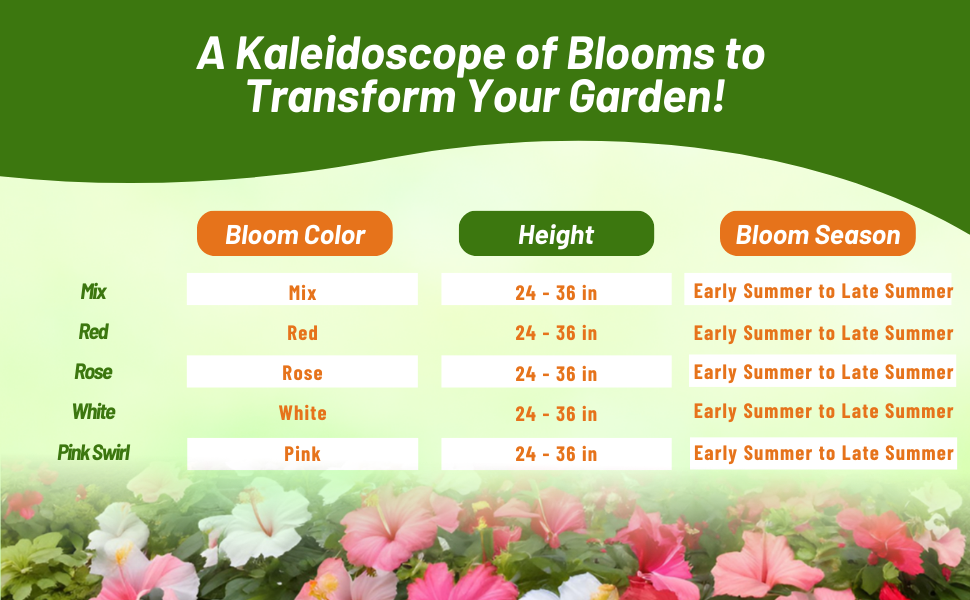
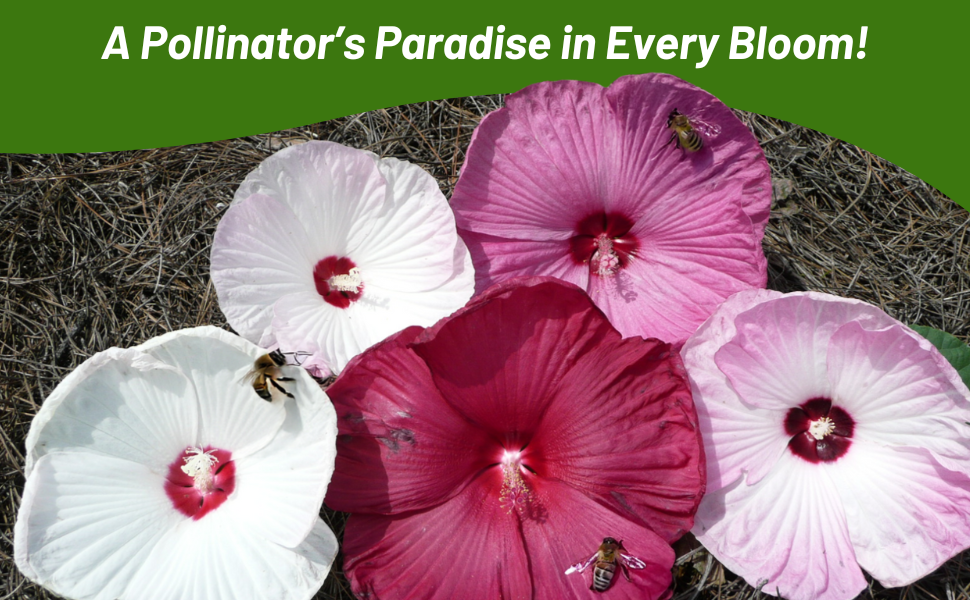
Hibiscus (Hibiscus Moscheutos Luna Pink Swirl) - With bright, pink 6 - 8 inch blooms and dark green foliage, this perennial is an absolute eye-catcher! Grown from Hibiscus seed, it is a compact, well-branched plant that is ideal for container plantings and landscape use.
Common Questions
Is hibiscus easy to grow?
Hardy hibiscus are more forgiving and easy to grow than tropical varieties because they tolerate a wider range of temperatures and wetter conditions.
How fast does hibiscus grow?
Hibiscuses are fast-growing, and, providing conditions are right, they can be fully established and flowering prolifically within two to three years.
How long does a hibiscus live?
While newer hybrids may not survive for more than ten years, it is quite common for older varieties to thrive for over five decades.
What are some good areas to use hibiscus in my landscape?
These are wonderful additions to perennial borders and beds for the dramatic blooms and containers. They are also great for areas along streams or ponds and rain gardens.
Do I need to deadhead my flowers?
To maintain a tidy appearance, you will need to deadhead the spent blooms.
When do I prune back my plants?
This is best done in the spring before any new growth appears.
Planting Directions
TEMPERATURE
70F
AVERAGE GERM TIME
14 - 21 days
LIGHT REQUIRED
Yes
DEPTH
Cover lightly, seed should be visible
SOWING RATE
1 - 2 seeds per plant
MOISTURE
Keep seed moist until germination
PLANT SPACING
24 - 36 inches
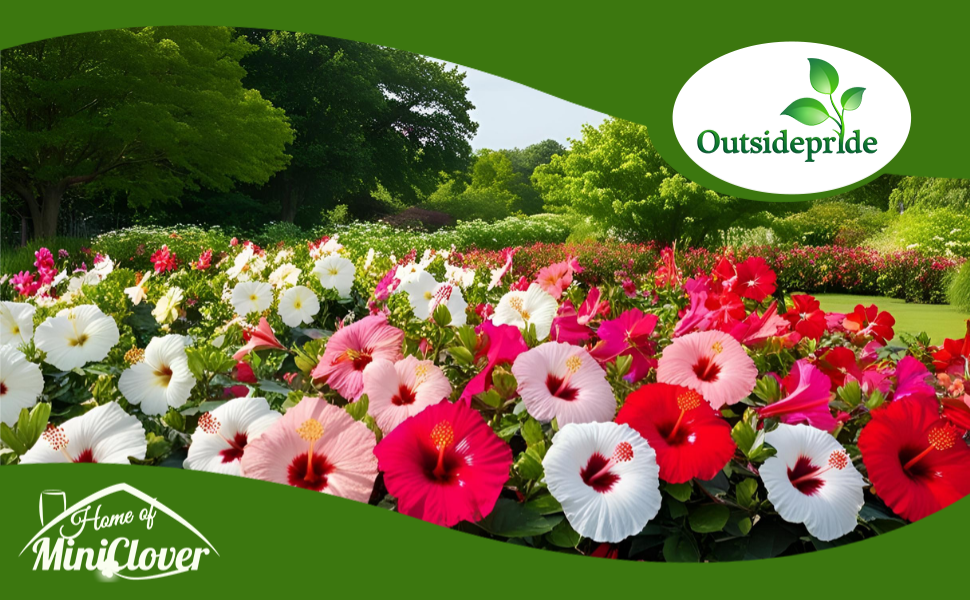
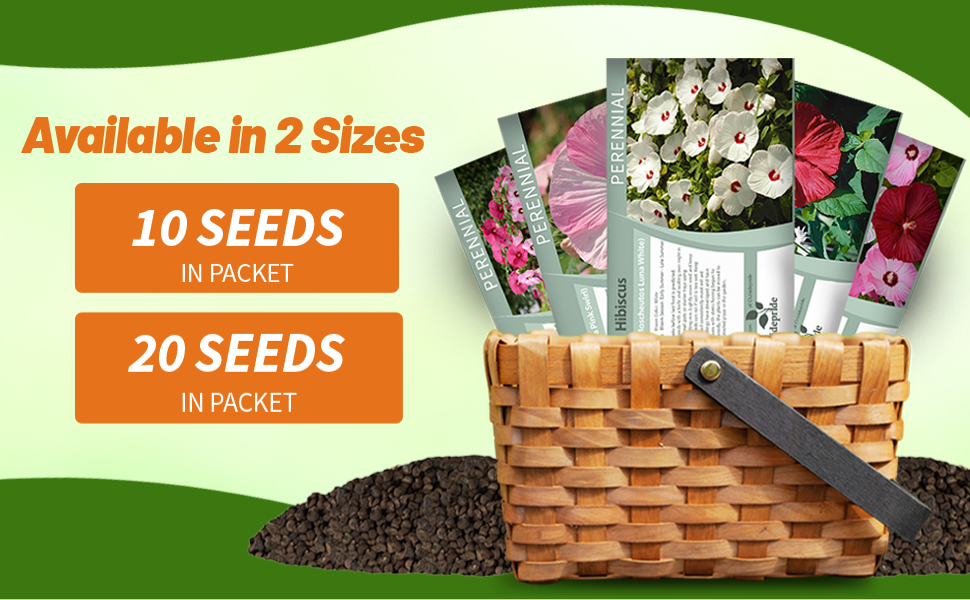
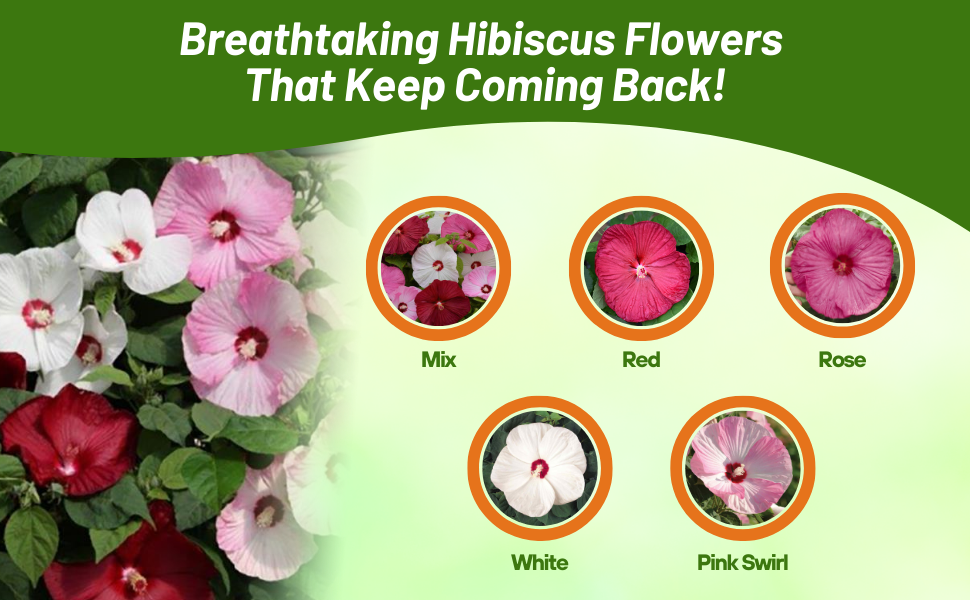
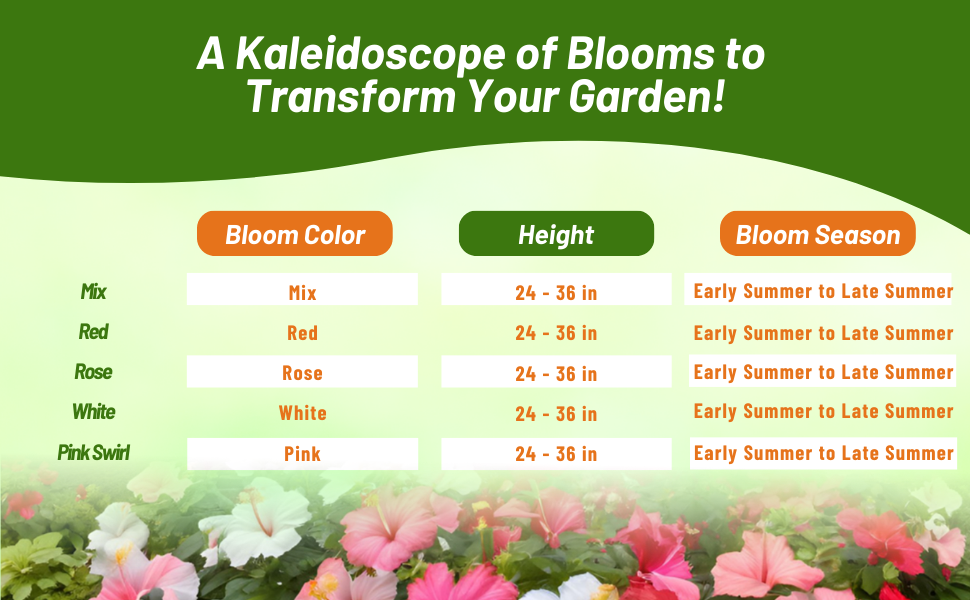
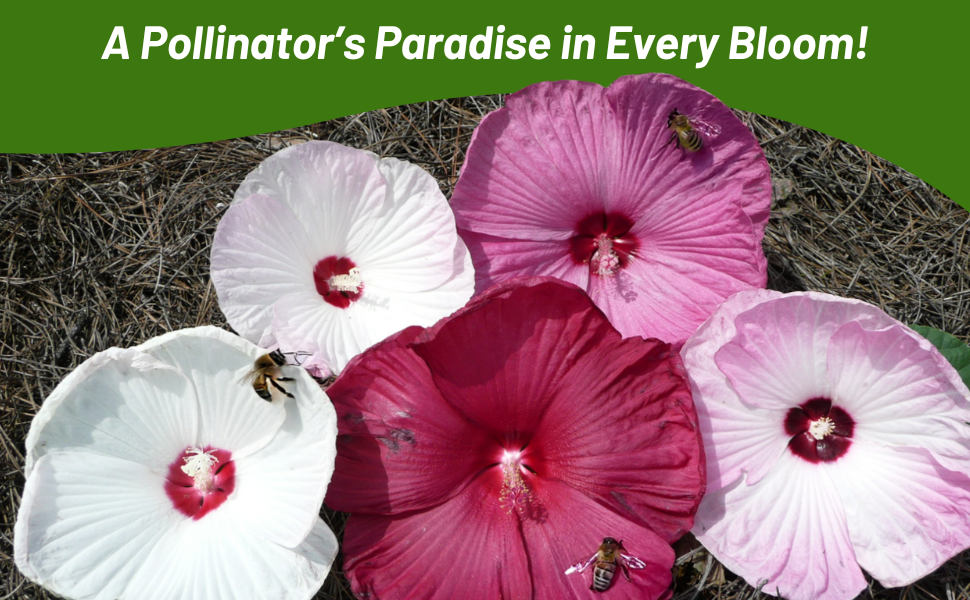
Hibiscus (Hibiscus Moscheutos Luna Mix) - With bright 6 - 8 inch blooms of pink, red, rose, and white and dark green foliage, this perennial is an absolute eye-catcher! Grown from Hibiscus seed, it is a compact, well-branched plant that is ideal for container plantings and landscape use. It reaches 24 - 36 inches tall and 24 inches wide and has a long bloom season. Once established, hardy Hibiscus withstands a variety of environmental conditions although it prefers a weekly deep watering. Hibiscus care includes deadheading the blooms to keep the plant producing more flowers all summer and into the fall.
Growing this Hibiscus flower seeds mix is not complicated. Start the flower seeds indoors 6 - 8 weeks before the last frost is predicted. Most gardeners recommend nicking the seeds with a knife and soaking them over night in warm water. Sow the flower seeds into small pots or starter trays using well-draining, sterile potting mix. Lightly cover the seed and keep moist, but not soggy. The seeds can actually rot if the soil is too wet. Keeping the temperature consistently warm and the soil consistently moist will aid germination. After seedlings have developed and there are several sets of true leaves with the stems having begun to harden and become woody, the young Hibiscus plant can be moved to larger pots or to a protected place in the garden. These tender young plants should be introduced to the sun gradually over several days. At this point a water soluble fertilizer can be used.
Common Questions
Is hibiscus easy to grow?
Hardy hibiscus are more forgiving and easy to grow than tropical varieties because they tolerate a wider range of temperatures and wetter conditions.
How fast does hibiscus grow?
Hibiscuses are fast-growing, and, providing conditions are right, they can be fully established and flowering prolifically within two to three years.
How long does a hibiscus live?
While newer hybrids may not survive for more than ten years, it is quite common for older varieties to thrive for over five decades.
What are some good areas to use hibiscus in my landscape?
These are wonderful additions to perennial borders and beds for the dramatic blooms and containers. They are also great for areas along streams or ponds and rain gardens.
Do I need to deadhead my flowers?
To maintain a tidy appearance, you will need to deadhead the spent blooms.
When do I prune back my plants?
This is best done in the spring before any new growth appears.
Planting Directions
TEMPERATURE
70F
AVERAGE GERM TIME
14 - 21 days
LIGHT REQUIRED
Yes
DEPTH
Cover lightly, seed should be visible
SOWING RATE
1 - 2 seeds per plant
MOISTURE
Keep seed moist until germination
PLANT SPACING
24 - 36 inches
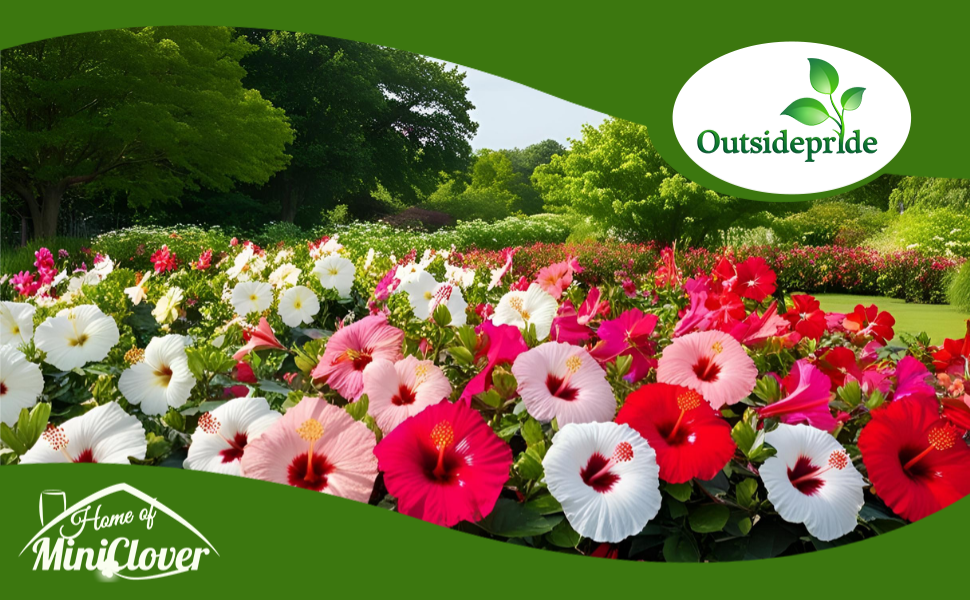
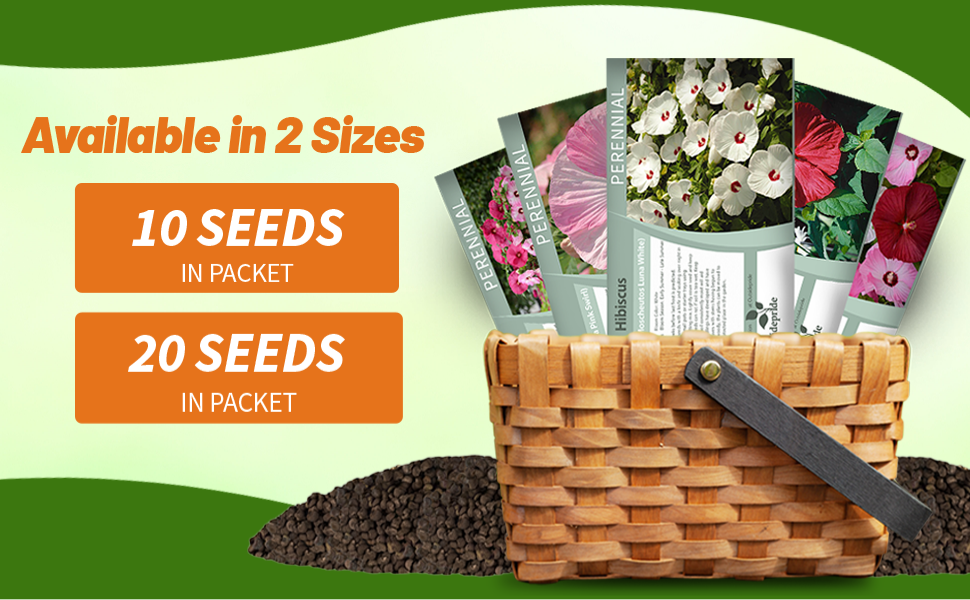
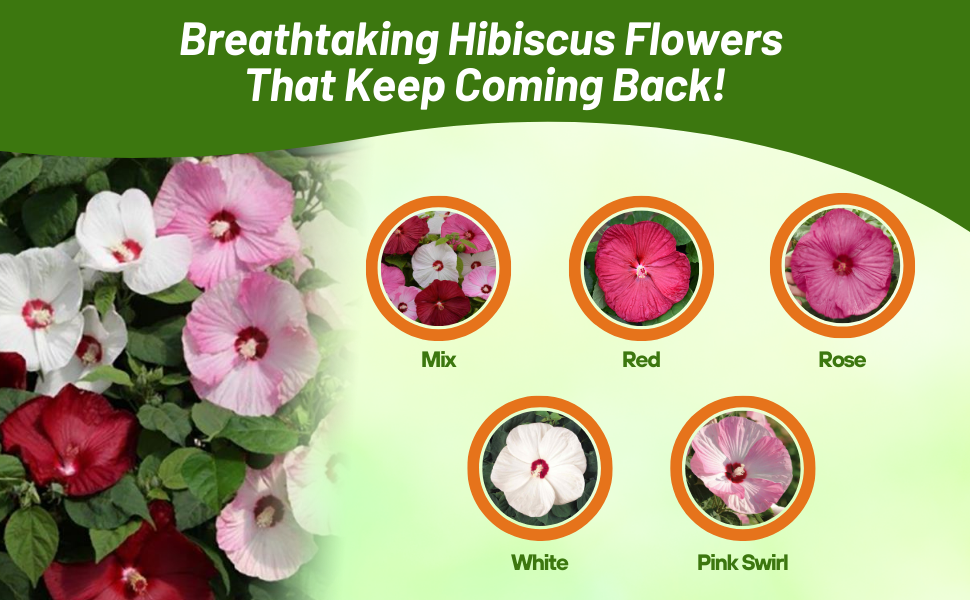
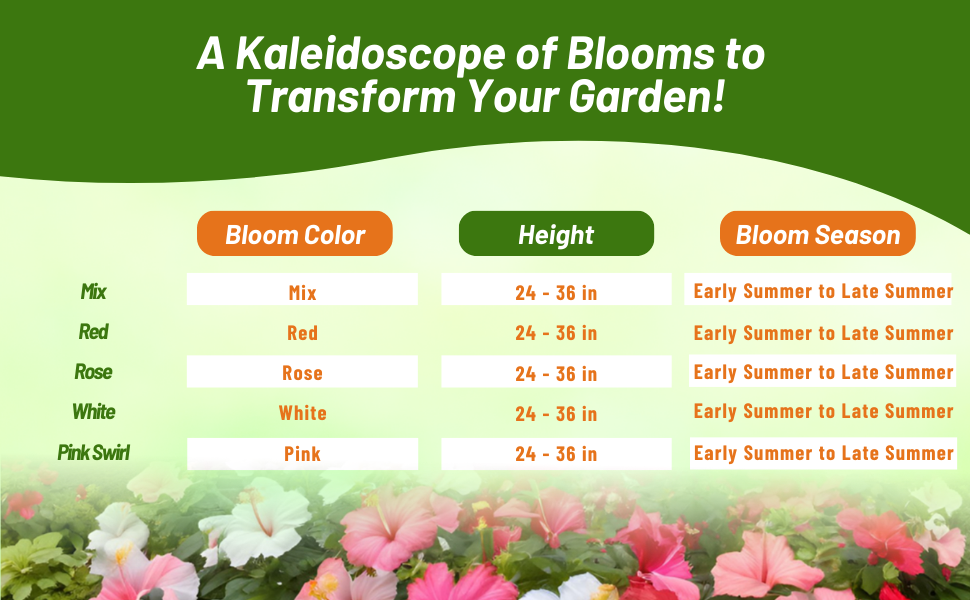
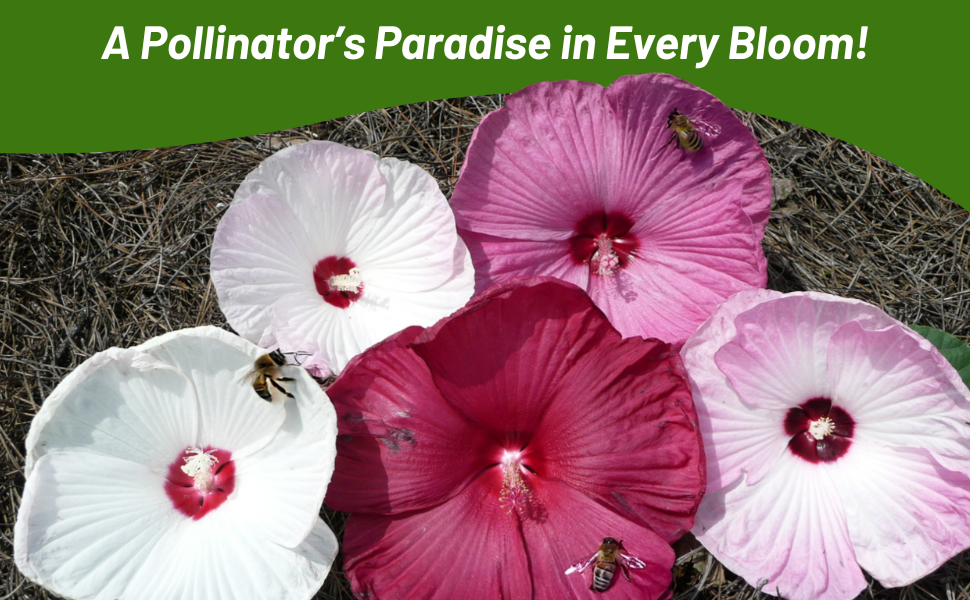
Hibiscus (Hibiscus Moscheutos Luna White) - With white 6 - 8 inch blooms and dark green foliage, this perennial is an absolute eye-catcher! Grown from Hibiscus seed, it is a compact, well-branched plant that is ideal for container plantings and landscape use.
Common Questions
Is hibiscus easy to grow?
Hardy hibiscus are more forgiving and easy to grow than tropical varieties because they tolerate a wider range of temperatures and wetter conditions.
How fast does hibiscus grow?
Hibiscuses are fast-growing, and, providing conditions are right, they can be fully established and flowering prolifically within two to three years.
How long does a hibiscus live?
While newer hybrids may not survive for more than ten years, it is quite common for older varieties to thrive for over five decades.
What are some good areas to use hibiscus in my landscape?
These are wonderful additions to perennial borders and beds for the dramatic blooms and containers. They are also great for areas along streams or ponds and rain gardens.
Do I need to deadhead my flowers?
To maintain a tidy appearance, you will need to deadhead the spent blooms.
When do I prune back my plants?
This is best done in the spring before any new growth appears.
















